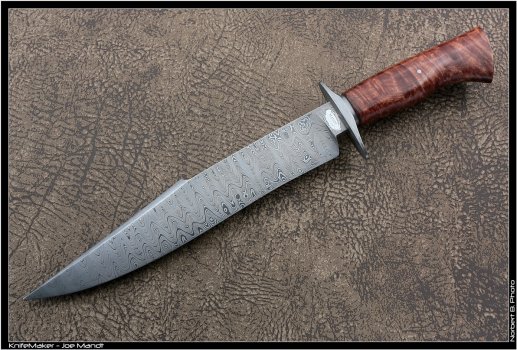Japanese smiths are very much stuck in tradition!! San Mai is easier to straighten and work/grind down with their big water cooled stone wheels and is more efficient material wise, but more inefficient labor wise! Yes, they can bend and not break, but mono steels can flex and return to true instead of staying bent. Forging a mono steel blade is easier to do simplicity wise, but softer mild steels move easier under the hammer (including cold forging) than a mono steel blade may, especially with the higher end mono steel. The San mai also acts as a "shock absorber" for the thinner, harder core material, especially in kitchen knives. Using 2/3 mild steel and 1/3 good core steel is usually less expensive, easier to thin, more forgiving. Using recycled material cuts way down on cost, too. Japanese makers often seem to be stuck in the past and more concerned with tradition than with actual performance. I have a Honyaki blade from a well known Japanese maker (Around $1000) and it's performance was so-so. Didn't really blow me away performance wise and other $200 Japanese knives performed the same or better for me, but it was a highly sought after blade/maker!
When you look at most Japanese knife makers, unless they are a large factory, they are smaller shops and use old equipment. Rarely do you see a 2x72 VFD belt sander, cnc machines, in a Japanese knife shop!! You may see a 4x36 or something similar, but they still do a LOT of grinding on large stone wheels. For their methods/equipment, san mai is easier for them. How long do you think it would take them to grind a mono steel blade in R2/SG2 on a stone wheel versus grinding a san mai blade with only the hard R2 at the core and much thinner? Mild/softer outer steel is easier to finish too, especially with their techniques.
They do succeed in spite of their materials/methods! I have many Japanese kitchen knives and have owned/played with many more! Compared to Henckels/Wustoff/Victorinox, they do much better. Compared to custom knife makers who make good kitchen knives (not all makers make good kitchen knives!!!), the performance is on par at best. They make good knives in spite of their techniques/materials/traditions holding them back, but many are not really innovating or looking to improve, but to honor the traditions.



